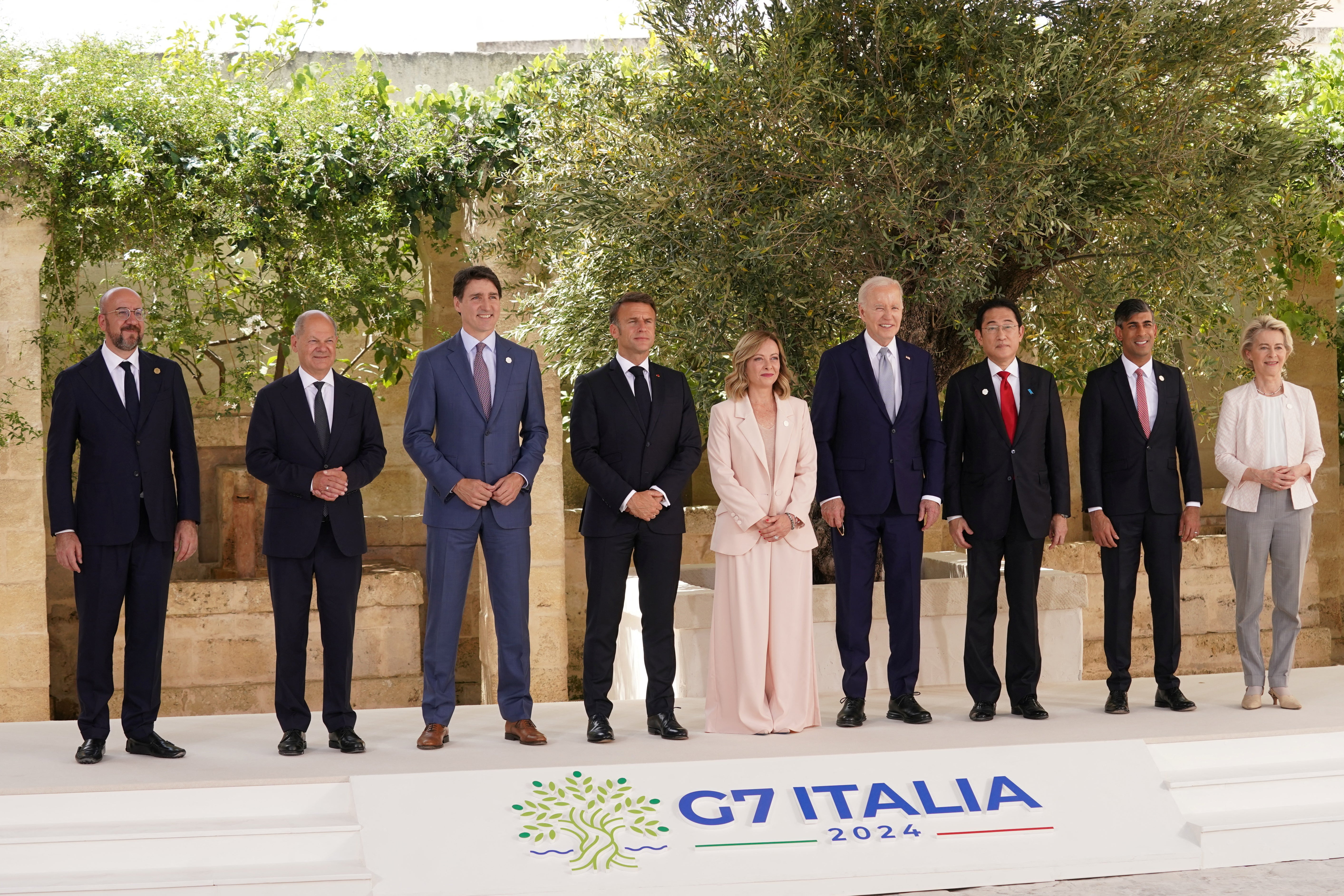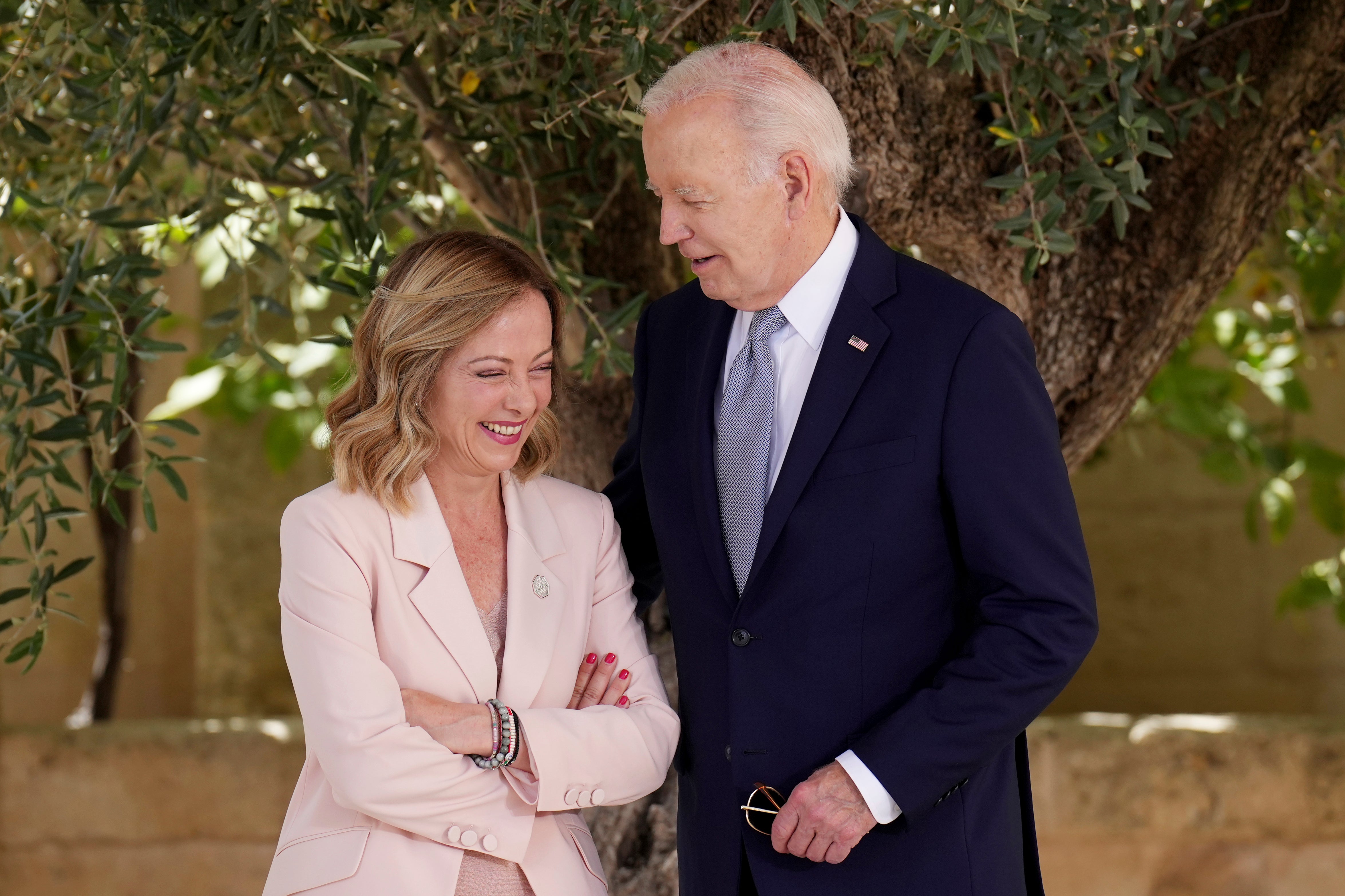Triumphant Meloni holds court at G7 summit as fellow leaders face uncertain futures
The three-day summit’s agenda carries clear signs of Ms Meloni’s domestic goals
Your support helps us to tell the story
From reproductive rights to climate change to Big Tech, The Independent is on the ground when the story is developing. Whether it's investigating the financials of Elon Musk's pro-Trump PAC or producing our latest documentary, 'The A Word', which shines a light on the American women fighting for reproductive rights, we know how important it is to parse out the facts from the messaging.
At such a critical moment in US history, we need reporters on the ground. Your donation allows us to keep sending journalists to speak to both sides of the story.
The Independent is trusted by Americans across the entire political spectrum. And unlike many other quality news outlets, we choose not to lock Americans out of our reporting and analysis with paywalls. We believe quality journalism should be available to everyone, paid for by those who can afford it.
Your support makes all the difference.Basking in her recent European election success, a triumphant Italian prime minister Giorgia Meloni is holding court at a G7 summit marked by the uncertain political futures facing her fellow leaders.
With her contemporaries in Puglia contending with challenging domestic elections or troubling poll ratings, the Italian premier alone has entered the summit from a position of stability, seeking to further her own agenda for Italy.
While the Ukraine war and stability brought by Joe Biden’s US presidency had lent unity to proceedings in recent years, the prospect of Donald Trump’s return and a number of other elections has imbued this week’s summit with a different sense of urgency to reach agreements while the status quo still remains in place.
High on the agenda is a plan to use the interest on frozen Russian assets to engineer a $50bn (£39bn) loan for Ukraine in its fight against Russia’s invasion, hoped to be delivered to Kyiv later this year. Leaders are keen to add action to their staunch words of support for Ukraine, as well as try to push for a Gaza ceasefire deal, while they can.
The precarious position of most world leaders meant expectations for the summit remained low – with France’s Emmanuel Macron and Germany’s Olaf Scholz facing an ascendant far-right – which has pushed Mr Macron into a snap election, Canada’s Justin Trudeau perceived to be fatigued by a lengthy premiership, and elections looming in the UK and US. As well as Japan’s Fumio Kishida facing low approval ratings and fending off calls for his own snap ballot.
“There are two levels to the G7: what’s the big narrative and what are the concrete deliverables – and on both counts, it looks like a very unlucky summit,” said Nathalie Tocci, head of the Italian Institute for International Affairs.
“If anything will come out of this summit, it’s the fear of a catastrophe playing out before our eyes,” Ms Tocci told the BBC.
But in a sign of her own bouyant position, Ms Meloni has also invited Pope Francis, Argentina’s populist president Javier Milei, Brazil’s left-wing president Luiz Inácio Lula da Silva, and Volodymyr Zelensky of Ukraine – in an apparent bid to show an outwards-looking West that is determined to confront Russia’s “arsenal of autocracy”.

India’s Narendra Modi and Recep Tayyip Erdogan of Turkey were also invited, as well as three African presidents – Abdelmadjid Tebboune of Algeria, Kenya’s William Ruto and Tunisia’s Kais Saied.
The three-day summit’s agenda carries clear signs of Ms Meloni, and her hard-right Brothers of Italy party’s domestic goals, with the initial focus on Africa, climate change and development mirroring her own desire to use Italy as an energy bridge between Africa and Europe, and to use investment in Africa as a tool to reduce irregular migration to Europe. Italy, along with Greece, has faced hundreds of thousands of arrivals by sea across the Mediterranean. The figure for Italy was 155,000 in 2023. The future of artificial intelligence is another topic on the agenda, with Ms Meloni worried about the impact on the jobs market.
In her opening address, Ms Meloni called for “concrete and measurable results” from the summit.
“The G7 is not a self-enclosed fortress, which needs to defend itself against others. It is a container of values, and we want to open to the world in order to have shared development and growth as our goal,” she said.
Known for its revolving-door governments, Italy is now in the unusual position of being the most stable power in the EU. Ms Meloni’s party had an even stronger showing in the European Parliament election this past weekend than the national general election in 2022 that made her Italy's first female premier. There are still issues domestically – a brawl erupted in Italy’s parliament on Wednesday over a controversial government bill that would give Italy’s regions greater autonomy – but Ms Meloni’s position is secure.

Nick O’Connell, deputy director of the Atlantic Council, said: “While it’s unlikely the recent results will radically shift the focus of the... G7 summit, this electoral win offers Premier Meloni additional leverage to frame this as an essentially ‘Mediterranean Summit’.”
“With a G7 led by Italy and taking place in Italy, Meloni can enter with all her political strength,” Giovanni Orsina, professor of political history at Rome’s Luiss University, told Politico, adding: “If she is skillful, she can end up with an important international success, managing to get the issues important to her on the agenda. Not many leaders are able to gain votes after two years governing.”
In a sign of the ability Ms Meloni has to flex her political muscle, her office denied reports that Italy was trying to water down language about access to abortion in the final communique – as a French official said there are diverging views with Italian negotiators on topics including sexual and reproductive health and vaccines.
Italian foreign minister Antonio Tajani confirmed abortion is being discussed, but said talks are continuing.
Elsewhere, Rishi Sunak announced £242m in new non-military aid to Ukraine, while Mr Biden planned to urge G7 allies to push Hamas into accepting a Gaza ceasefire proposal backed by Israel, and to discuss “the continuing threat posed by Iran”.
Mr Zelensky was pushing for expedited fighter plane deliveries and training for Ukrainian pilots, in addition to more air defences and long-range weapons, and was expected to sign security agreements with Japan and the US, echoing those agreed with the UK and more than a dozen other Nato allies.
Pope Francis, courting controversy of his own after being accused of repeating a homophobic slur during a closed-door meeting, is also set to become the first pontiff to address a G7 summit, giving a speech on Friday on the promises and perils of AI, and is expected to appeal for peace in Gaza and Ukraine.

Join our commenting forum
Join thought-provoking conversations, follow other Independent readers and see their replies
Comments